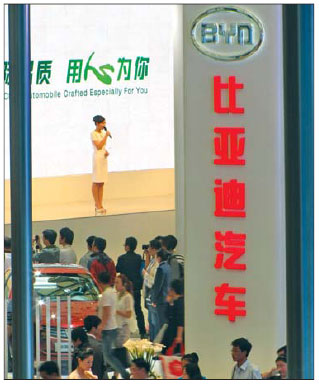Plug pulled on BYD financing venture
Updated: 2011-07-11 11:18
By Xu Xiao (China Daily)
|
|||||||||||
BEIJING - Domestic automaker BYD has agreed to terminate a planned joint venture with a subsidiary of French bank Societe Generale that would have offered financing for new car purchases, the carmaker announced on July 5.
 |
|
BYD cars are low priced, so analysts question the need for financing - most customers pay cash.?[Photo/China Daily] |
BYD said the deal with the bank's subsidiary CGL fell through due to the lender's doubts about the Chinese auto market.
"CGL believed that risks in the market are increasing," BYD said in the announcement.
According to an agreement between BYD and CGL signed last summer, the two sides were to establish a joint venture with 500 million yuan in registered capital - 400 million yuan from BYD for an 80 percent stake and 100 million yuan from CGL for the remaining 20 percent.
The joint venture for car loans was approved by the China Banking Regulatory Commission on March 4. Yet BYD suddenly announced the agreement was terminated on July 5. CGL will pay BYD 2.25 million yuan in compensation before July 31.
Industry insiders speculate the reasons the deal failed could be different from BYD's public announcement.
"I wonder if the French company is questioning BYD's prospects in the auto financing market," said Cao He, an auto analyst at Beijing-based China Minzu Securities.
Other analysts hold similar views, according to the Dongfang Daily newspaper in Shanghai.
China's auto market is no doubt the world's biggest, said analysts, and so is the country's potential auto financing market.
They are not persuaded CGL is pessimistic about prospects in the overall market.
A stumbling block could be BYD's products, which are priced starting at 36,900 yuan and are mostly less than 100,000 yuan.
"The cars are not expensive, so few buyers would ask for a loan to buy one," said Cao He.
BYD went public on the Shenzhen Stock Exchange on June 30 and its price soared 41 percent by the end of the first day of trading.
Cao said the sharp rise was due a general auto segment uptrend on stock markets and high expectation for new-energy vehicles.
As well, the backing of US billionaire Warren Buffet - whose company purchased a 9.9 percent stake of BYD for $230 million (about 1.49 billion yuan) in 2008 - has given the company further credibility.
BYD sold 520,000 vehicles in 2010, while China's biggest automaker SAIC Motor sold 3.6 million units in the same year.
The company posted an 84.35 percent year-on-year decrease in net profit in the first quarter of 2011, according to the company's financial statement issued at the end of June.
By last week the price of BYD shares had increased about 85 percent over its IPO price of 18 yuan to trade in the 33 yuan range.
Cao said he is not optimistic about a continued rise in BYD's share price in the near term, noting its poor first-quarter performance and the consensus its new energy vehicle business will not be profitable in the near future.